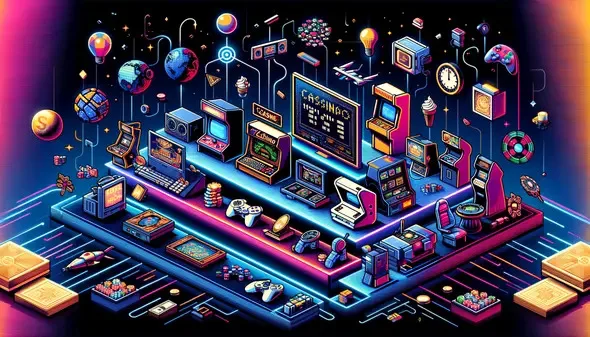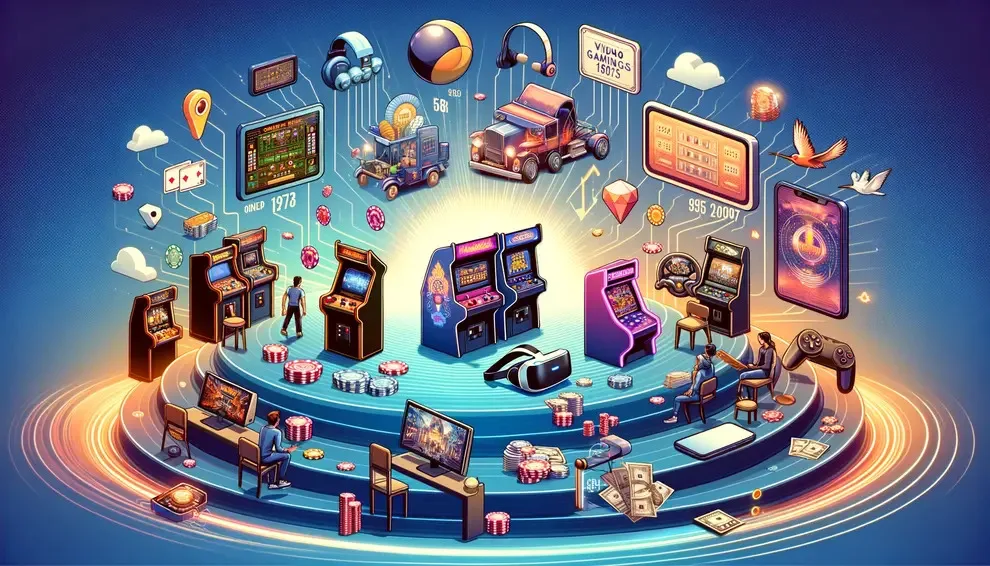
The intersection of casino games and video gaming platforms represents a fascinating journey through the evolution of digital entertainment. From simple card games embedded in early software to the complex, immersive experiences found in today’s virtual worlds, the integration of gambling mechanics into video games has grown both in sophistication and popularity. This article explores the milestones of this evolution, highlighting how casino elements have become a staple in the gaming industry.
The incorporation of casino games into video gaming platforms can be traced back to the earliest days of personal computers and consoles. Simple versions of poker and blackjack appeared on platforms like the Atari 2600, introducing players to the thrill of gambling from the comfort of their own homes. These rudimentary implementations laid the groundwork for the complex integration of casino mechanics seen in today’s games.
The video game industry has seen a significant leap in the refinement of the in-game environment, leading to the emergence of full-fledged casinos in digital worlds. This innovation has allowed players to not just participate in the storyline and combat mechanics, but to take part in gambling as an integral part of the game universe. In games such as “Fallout: New Vegas” and “Grand Theft Auto”, casinos and gambling establishments such as Foxwoods Resort Casino or MGM Grand Casino (more information about them can be found in the article https://marizdekor.pl/najpiekniejsze-kasyna/) appeared. where players could try their luck at card games and slot machines using in-game currency.
This integration served several purposes: it enriched the gaming world with additional levels of interaction and provided players with leisure activities that could yield in-game rewards. It also introduced gamers to the excitement and mechanics of casino gaming in a risk-free environment. The advent of these in-game casinos was a turning point in gaming history, demonstrating the ability of developers to create complex, multifaceted worlds that can mimic real-world events with amazing authenticity.
The advent of online multiplayer gaming opened new avenues for the integration of casino games. Massively Multiplayer Online Games (MMOs) and online platforms started offering casino-style mini-games, enabling players to gamble virtual currency against each other. This added a social element to the gambling experience, making it more engaging and competitive.
Virtual reality (VR) technology has begun to revolutionize the casino game integration within video gaming platforms. VR casinos offer players an immersive experience that closely mimics visiting a real-world casino, complete with detailed environments and interactive elements. This technology promises to blur the lines between virtual and physical gambling spaces even further.

The rise of mobile gaming has significantly impacted the presence of casino games in the digital space. Mobile apps dedicated to slots, poker, and other casino staples have become incredibly popular, offering easy access to gambling experiences on the go. The simplicity and accessibility of mobile gaming have played a crucial role in popularizing casino games among a broader audience.
Social gaming platforms have also embraced casino elements, integrating them into games that prioritize social interaction. Games on platforms like Facebook have introduced casino mechanics to a wide audience, often leveraging the social network to encourage competition and sharing among friends. This integration has helped demystify casino games, presenting them as just another aspect of social gaming.
The future of casino games within video gaming platforms looks bright, with emerging technologies like blockchain and continued advancements in VR set to offer even more immersive and secure gambling experiences. Additionally, the trend towards gamification in non-gaming contexts suggests that casino elements may find their way into a broader range of digital experiences.
The integration of gambling mechanics into video games is not without its controversies, raising legal and ethical considerations around gambling addiction and the exposure of minors to gambling content. Developers and regulators alike must navigate these challenges carefully, ensuring that games remain entertaining and engaging without exploiting vulnerable players.
The evolution of casino games within video gaming platforms reflects broader trends in technology, culture, and society. From simple card games to complex, immersive virtual casinos, the journey of casino games in the digital realm is a testament to the enduring allure of gambling. As technology advances, the line between gaming and gambling continues to blur, promising new experiences and challenges for developers, players, and regulators alike.

High Dynamic Range has been part of gaming for years, …

Gaming monitor spec sheets are full of numbers that sound …